
Ignacio de Loyola is a 2016 Philippine historical biographical religious drama film directed by Paolo Dy in his directorial debut. It is based on the memoirs of Ignatius of Loyola, founder of the Jesuit order who was canonized as a saint in the Catholic Church. The film stars Andreas Muñoz, a Spanish actor who portrays the titular character in the film.
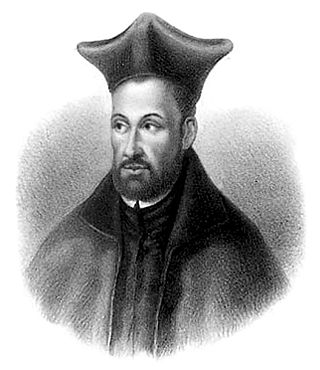
Peter Faber, SJ was a Savoyard Catholic priest, theologian and co-founder of the Society of Jesus, along with Ignatius of Loyola and Francis Xavier. Pope Francis announced his canonization in 2013.

Gipuzkoa is a province of Spain and a historical territory of the autonomous community of the Basque Country. Its capital city is Donostia-San Sebastián. Gipuzkoa shares borders with the French department of Pyrénées-Atlantiques at the northeast, with the province and autonomous community of Navarre at east, Biscay at west, Álava at southwest and the Bay of Biscay to its north. It is located at the easternmost extreme of the Cantabric Sea, in the Bay of Biscay. It has 66 kilometres of coast land.
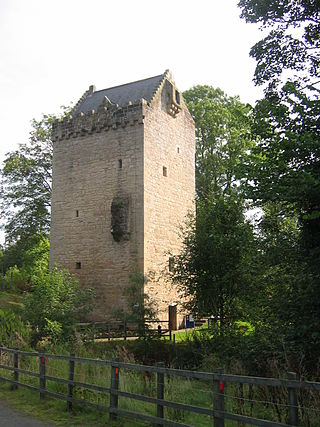
A tower house is a particular type of stone structure, built for defensive purposes as well as habitation. Tower houses began to appear in the Middle Ages, especially in mountainous or limited access areas, to command and defend strategic points with reduced forces. At the same time, they were also used as an aristocrat's residence, around which a castle town was often constructed.
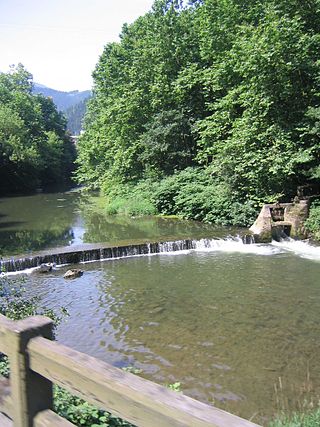
The Urola is a river and valley in Gipuzkoa, Basque Autonomous Community, Spain.

St Ignatius College is a Catholic voluntary aided secondary school for boys aged 11–18 in Enfield, London, England, founded by the Society of Jesus in 1894 and completely moved to its present site by 1987. It was a grammar school until 1968, only accepting boys who had passed the Eleven plus exam. Former students include Alfred Hitchcock, George Martin, and Cardinal John Heenan.

Azpeitia is a town and municipality within the province of Gipuzkoa, in the Basque Country, Spain, located on the Urola river a few kilometres east of Azkoitia. Its population is 14,580. It is located 41 kilometres southwest of Donostia/San Sebastián.
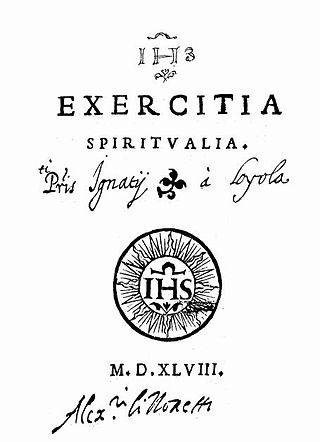
The Spiritual Exercises, composed 1522–1524, are a set of Christian meditations, contemplations, and prayers written by Ignatius of Loyola, a 16th-century Spanish Catholic priest, theologian, and founder of the Society of Jesus (Jesuits).

Leintz Gatzaga is a town located in the province of Gipuzkoa, in the Autonomous Community of Basque Country, northern Spain. The municipality's population is 251 (2015).

Zumarraga is a municipality and industrial town in Gipuzkoa province of the Basque Country autonomous community of northern Spain, approximately 35 miles (56 km) by road southwest of San Sebastián and 10 miles (16 km) northwest of Idiazabal. As of 2018 the municipality had a population of 9834 people. The Urola river flows through the vicinity. It is the birthplace of Miguel López de Legazpi, conquistador who explored the Pacific Islands and the East Indies, and of Iñaki Urdangarín, the husband of Infanta Cristina of Spain.

Juan de Anchieta was a leading Spanish Basque composer of the Renaissance, at the Royal Court Chaplaincy in Granada of Queen Isabel I of Castile.

The Basque Autonomous Community [ A.C.] also officially called Euskadi [] is an autonomous community in northern Spain. It includes the Basque provinces of Araba, Bizkaia, and Gipuzkoa. It also surrounds an enclave called Treviño.

Ignatius of Loyola, venerated as Saint Ignatius of Loyola, was a Basque Spaniard Catholic priest and theologian, who, with six companions, founded the religious order of the Society of Jesus (Jesuits), and became its first Superior General, in Paris in 1541.

A baserri is a traditional half-timbered or stone-built type of housebarn farmhouse found in the Basque Country in northern Spain and Southwestern France. The baserris, with their gently sloping roofs and entrance portals, are highly characteristic of the region and form a vital part in traditional Basque societal structures. They are also seen to have played an important role in protecting the Basque language in periods of persecution by providing the language with a very dispersed but substantial speaker base.
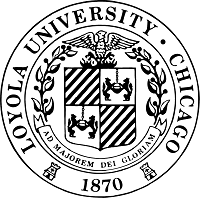
Loyola University Chicago is a private Jesuit research university in Chicago, Illinois, United States. Founded in 1870 by the Society of Jesus, Loyola is one of the largest Catholic universities in the United States. Its namesake is Saint Ignatius of Loyola. Loyola's professional schools include programs in medicine, nursing, and health sciences anchored by the Loyola University Medical Center, and the Loyola University Chicago School of Law. It is classified among "R2: Doctoral Universities – High research activity".

The Sanctuary of Loyola or Loiola, or the Shrine and Basilica of Loyola, consists of a series of edifices built in Churrigueresque Baroque style around the birthplace of St. Ignatius of Loyola, founder of the Society of Jesus.

The autonomous community of the Basque Country within Spain contains several comarcas or eskualdeak in the Basque language, referring to local districts, grouped into its three long-established provinces.

The Iglesia de la Compañía de Jesús is a historic Jesuit church in Cusco, the ancient capital of the Inca Empire, in Cusco Region, Peru. It is situated in the Plaza de Armas de Cusco, the city center. It is built on an Inca palace. It is one of the best examples of Spanish Baroque architecture in Peru. The architecture of this building exerted a great influence on the development of many Baroque architecture in the South Andes. Its construction began in 1576, but it was badly damaged in an earthquake in 1650. The rebuilt church was completed in 1673.

Saint Ignatius of Loyola Parish Church, commonly known as Capul Church or Fuerza de Capul, is a Roman Catholic fortress church in the municipality of Capul, Northern Samar, Philippines within the jurisdiction of the Diocese of Catarman. It was first established as a mission station by the Jesuits in 1596 under the advocacy of Saint Ignatius of Loyola.






















